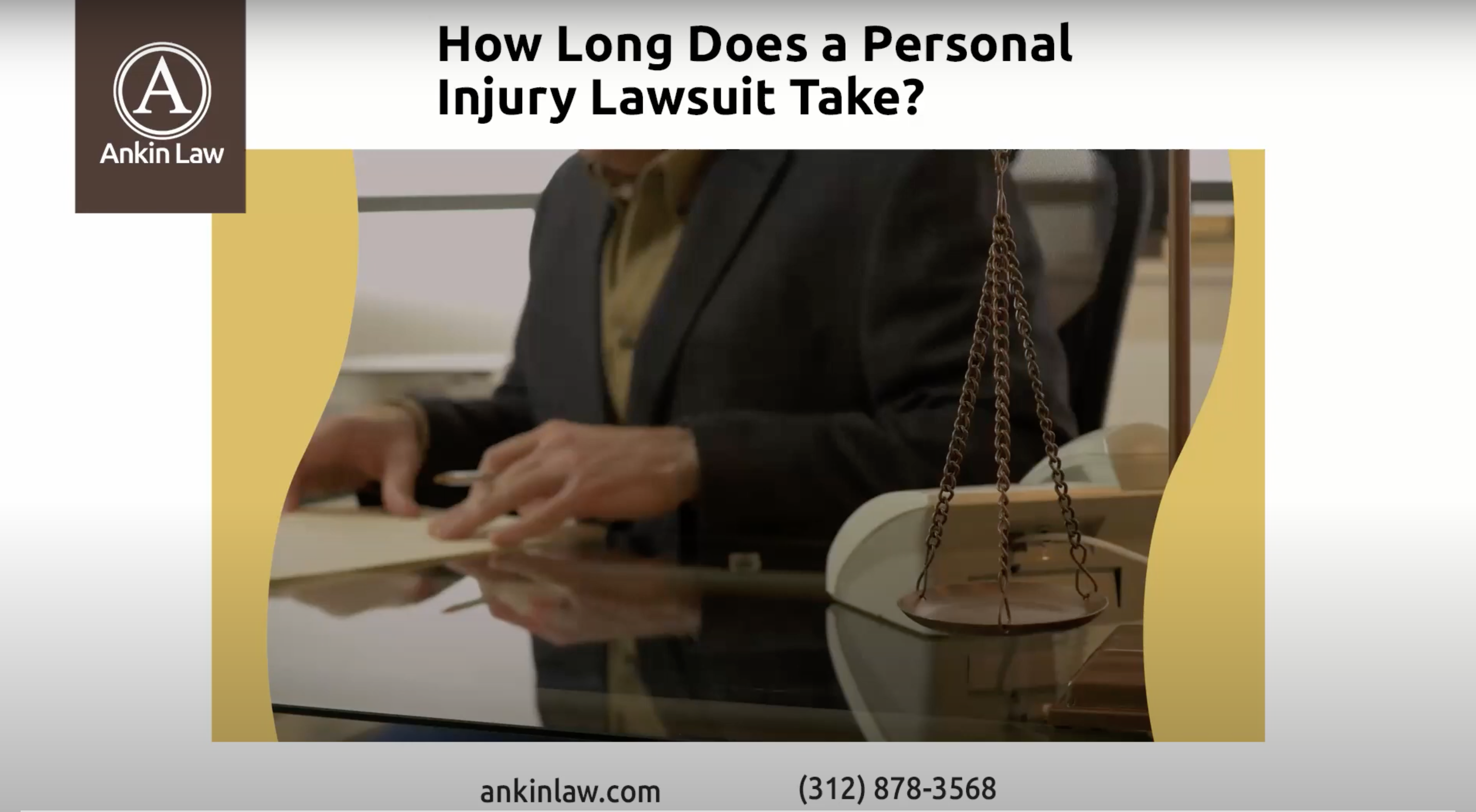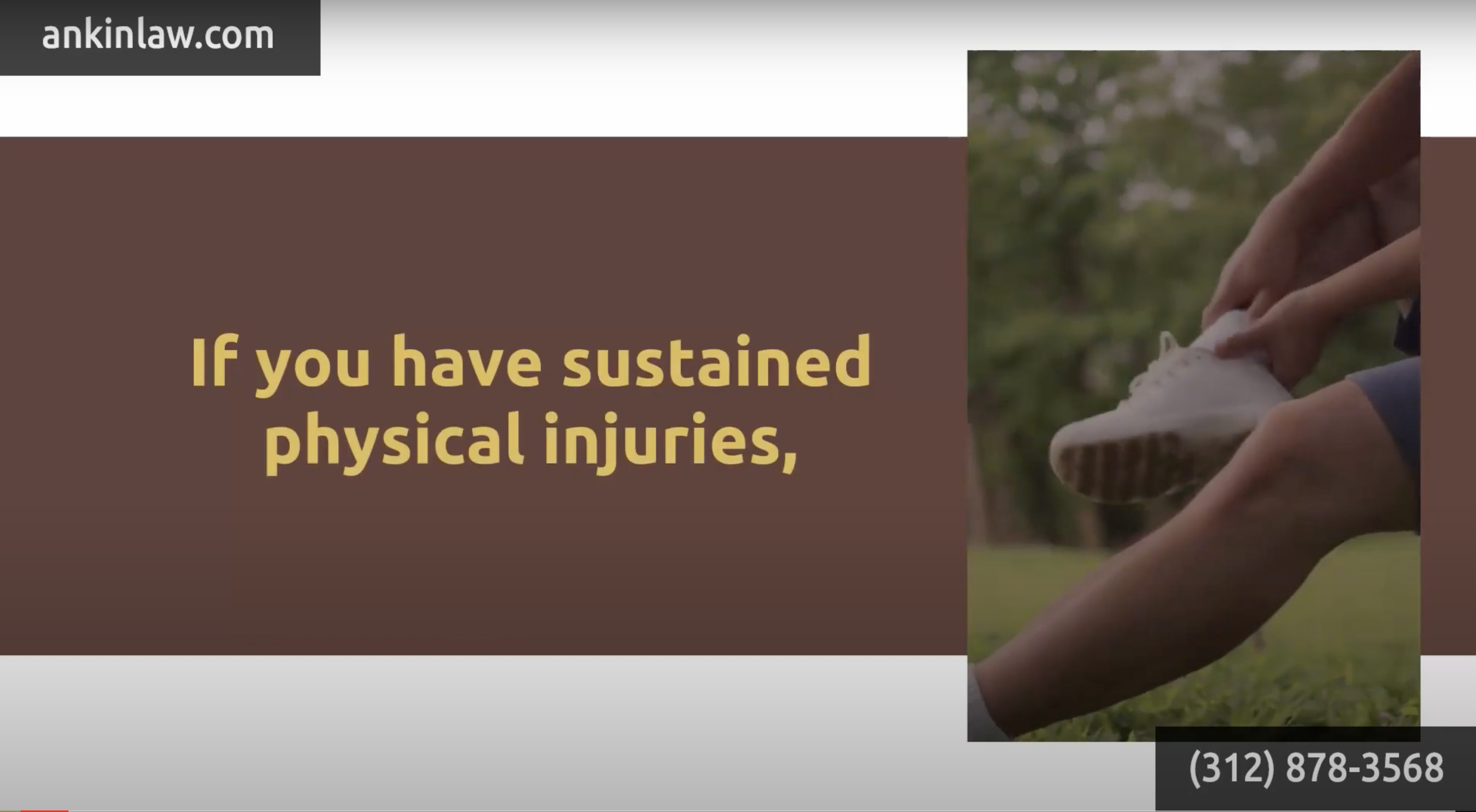Personal Injury Knowledge Center
Welcome to our personal injury knowledge center. Here, you’ll find an abundance of helpful information about personal injury cases in Illinois.
Our law firm is committed to helping the people of Chicagoland who are navigating through the aftermath of car accidents, trucking accidents, slips and falls, and other types of personal injury cases. Our Chicago injury lawyers have provided answers to clients’ frequently asked questions, valuable insights about what personal injury cases are, how to choose the right personal injury attorney, and updates about the laws and regulations that surround personal injuries in the state.
If you or your loved one suffered injuries at the hands of a negligent party, contact our personal injury attorneys right away for a FREE, no obligation case evaluation. Call (312) 600-0000.
Table of Contents
How Long do I Have to File a Personal Injury Lawsuit?
Claimants have a two-year window within which to file a personal injury lawsuit or claim. This deadline is referred to as the statute of limitations, and the clock starts ticking on the date the accident occurs. In cases where injuries are not immediately apparent, the statute of limitations starts when the injuries are discovered or should have been discoverable.
What Are Some Exceptions to the Statute of Limitations in Injury Lawsuits?
Special circumstances apply to the statute of limitations in some cases. The delay of the statute of limitations is refereed to as tolling. Exceptions to the statute of limitations in injury lawsuits in Illinois may include, but are not limited to:
- If a medical malpractice victim is under the age of 18, a lawsuit may be filed up to eight years after the date the medical treatment was received. However, legal action can generally not be taken after the victim turns 22.
- If fraudulent concealment applies to a medical malpractice case, the filing can take place up to five years from the date of the incident.
- In personal injury cases involving victims who have a legal disability, the statute of limitations is paused until the disability is removed.
- If the personal injury victim suffers a legal disability after the incident occurs, the statute of limitations is paused until the disability is removed as long as the disability occurs before the statute of limitations expires.
In Illinois, Medicaid has the right to seek reimbursement from your personal injury settlement to cover medical bills it paid related to the injury. However, Illinois has certain protections for the injured party. The Health Care Services Lien Act limits Medicaid’s recovery to a portion of your settlement specifically allocated to past medical expenses. Medicaid can claim reimbursement only from that part of the settlement.
Your attorney may be able to negotiate with Medicaid to help reduce the amount owed. Strategies like establishing a special needs trust or proving hardship may also safeguard a portion of your settlement.
Personal injury attorneys in Illinois play a crucial role in managing medical bills after an accident. Your attorney will assist by liaising with healthcare providers to postpone billing until the case is resolved, allowing you to focus on your recovery without enduring immediate financial strain. Your lawyer may also negotiate any medical liens and bills, aiming to reduce the amount payable from your settlement. In Illinois, attorneys often work to ensure that medical bills are fully considered in the settlement negotiations, aiming for adequate compensation to cover these expenses.
Additionally, attorneys guide their clients on health insurance claims, ensuring proper utilization of available coverage while seeking compensation for uncovered medical expenses through the legal process. They aim to alleviate the burden of medical bills, maximizing the recovery for the injured party.
- Personal Injury Lawyer
- Back Injury Lawyer
- Burn Injury Lawyer
- Bedsore Lawyer
- Catastrophic Injury Lawyer
- Child Injury Lawyer
- Concussion Lawyer
- Dog Bite Lawyer
- Dram Shop Lawyer
- Elevator Accident Lawyer
- Food Poisoning Lawyer
- Head Injury Lawyer
- Hearing Loss Lawyer
- Eye Injury Lawyers
- Neck Injury Lawyer
- Nursing Home Abuse Lawyer
- Restaurant Accident Lawyer
- School Slip and Fall Lawyer
- Sexual Abuse Lawyer
- Spinal Cord Injury Lawyer
- Spine Injury Attorney
- Sports Injury Lawyer
- Brain Injury Attorney
- Catastrophic Property Damage Lawyer
- Mold Lawyer
- Wrongful Death Lawyer
- Whiplash Lawyer
- Rosemont Personal Injury Lawyer
- Schaumburg Personal Injury Lawyer
- Orland Park Personal Injury Lawyer
The likelihood of winning a personal injury lawsuit in Chicago hinges on various factors. Each case is influenced by the available evidence, the extent of injuries, liability determination, and the legal experience and skill of the injury lawyer. Success depends on establishing negligence or fault, solidifying evidence, and proving damages caused by the incident. Chicago’s legal landscape, comprising case precedents and jury tendencies, also impacts outcomes.
Engaging a knowledgeable attorney who is proficient in Illinois law enhances the chances of success. Legal professionals assess the case’s strengths and weaknesses, strategize accordingly, and negotiate or litigate to achieve a favorable resolution. While no guarantees exist in litigation, thorough preparation, compelling evidence, and skilled legal representation increase the likelihood of a successful outcome in a personal injury case in Chicago.
To find the best personal injury lawyer in Chicago, consider several crucial factors. Start by seeking referrals from trusted sources like friends, family, or other attorneys. Research extensively, examining lawyers’ backgrounds, experience in personal injury cases, and their success rates. Look for attorneys with a strong track record in Chicago courts and those who have experience in your specific injury type. Assess the lawyer’s communication style, willingness to listen, and dedication to your case. Consultation meetings are vital. Ask pertinent questions about the attorney’s approach, fees, and potential outcomes. Ensure the law firm has the resources and team to handle your case effectively.
Ultimately, select an attorney you feel comfortable with, who demonstrates knowledge, skill, empathy, and a commitment to advocating for your best interests.
A civil lawsuit involves legal action pursued between private parties or entities seeking resolution or compensation for a dispute or harm. These cases typically revolve around breaches of contracts, personal injury claims, property disputes, or employment issues. In civil litigation, the plaintiff, the party initiating the lawsuit, alleges that the defendant, the opposing party, caused harm or violated the victim’s rights. The court processes this through a trial or settlement negotiation, aiming to resolve the matter fairly.
The outcome may involve monetary compensation, injunctive relief, or specific performance. Civil lawsuits follow specific legal procedures, involving pre-trial stages, evidence presentation, and the judge or jury issuing a verdict based on the evidence and applicable laws.
1 Filing the Complaint: The plaintiff outlines the incident, injuries, and damages suffered.
2 Discovery: Both sides exchange information, including evidence and witness testimonies.
3 Negotiation or Trial: Parties often engage in settlement negotiations; otherwise, the case proceeds to trial.
4 Verdict or Settlement: A judge or jury issues a verdict based on evidence or parties reach a settlement agreement. The outcome may result in compensation for medical bills, lost wages, pain, suffering, and other damages incurred due to the injury. Legal representation aids in navigating this process and advocating for the plaintiff’s rights.
Proving emotional distress caused by a physical injury in Chicago involves demonstrating the correlation between the injury and subsequent emotional suffering. This often requires:
1 Medical Records: Documentation from healthcare professionals linking the physical injury to emotional distress.
2 Expert Testimony: Mental health professionals can provide expert testimony, validating the emotional impact caused by the physical injury.
3 Witness Testimony: Statements from family, friends, or colleagues witnessing changes in behavior or demeanor post-injury.
4 Diagnosis and Treatment: Records of diagnosis and treatment for emotional distress, such as therapy sessions or prescribed medication.
5 Consistency in Statements: Ensuring statements made regarding emotional distress align with other evidence presented.
Your attorney will provide guidance and assist you in collecting evidence to establish the relationship between the physical injury and resultant emotional distress.
A catastrophic injury refers to severe, life-altering injuries, often causing profound and enduring physical, emotional, or cognitive impairment. These injuries, sustained in accidents like car crashes falls, and those that are caused by medical malpractice, significantly impact a person’s quality of life. They involve substantial and permanent damage, such as spinal cord injuries, traumatic brain injuries, loss of limbs, severe burns, or paralysis.
Catastrophic injuries result in long-term or permanent disabilities, necessitating extensive medical care, ongoing therapy, and adaptive equipment. These injuries affect the individual and also burden families with immense emotional and financial challenges. Victims usually require comprehensive legal representation to recover compensation to pay for lifelong care and rehabilitation.
In Chicago, catastrophic injuries can significantly impact the statute of limitations for filing personal injury claims. Typically, the statute of limitations sets a deadline for initiating legal action after an injury occurs. However, with catastrophic injuries that result in severe physical, cognitive, or emotional impairment, the timeframe may vary.
In some cases, the statute of limitations might be extended or “tolled” until the injured party or the victim’s family can reasonably pursue legal action. This extension acknowledges the complexity of catastrophic injury cases, allowing individuals and families more time to address immediate medical needs and stabilize their situation before pursuing legal recourse.
A personal injury claim in Illinois emerges when an individual suffers harm due to another’s negligence or intentional actions. It encompasses various scenarios, including slip and fall accidents, motor vehicle collisions, medical malpractice, product defects, or workplace incidents.
For a successful claim, the injured party (plaintiff) must establish the negligence or fault of another party (defendant), causing their injury. This entails proving duty of care owed by the defendant, breach of that duty, a direct link between the breach and the injury (causation), and resulting damages. Personal injury claims aim to compensate victims for physical, emotional, and financial losses incurred due to the incident.
A personal injury lawyer serves as an advocate for individuals who have suffered harm due to others’ negligence or intentional actions. Attorneys navigate complex legal procedures, offering counsel, representation, and support throughout the injury case.
Lawyers assess the incident, gather evidence, liaise with insurance companies, and negotiate settlements. They construct a compelling case by investigating the circumstances, interviewing witnesses, and collaborating with experts if needed. In court, they advocate for their clients, presenting arguments, cross-examining witnesses, and fighting for fair compensation. Their primary goal is to secure the best possible outcome, ensuring that clients receive the compensation they deserve for physical, emotional, and financial damages resulting from the injury.
The trajectory of a personal injury case varies. Many are resolved without going to trial. Most cases reach settlement through negotiation between attorneys, insurers, or parties involved. Trials are pursued when settlements aren’t agreeable or fair.
Factors influencing trial likelihood include the evidence’s strength, the parties’ willingness to negotiate, and the insurer’s stance.
Attorneys weigh the potential outcomes and advise clients accordingly, but the decision to go to trial ultimately rests with the client.
Trials can be lengthy, costly, and uncertain, so attorneys often explore settlement options first. However, if negotiations don’t yield adequate compensation, a trial might be pursued to secure fair recompense for damages incurred due to the injury.
What Our Clients Say About Us
This is a very good law firm. Being represented by them in a worker’s comp & personal injury case. If there are any issues with dealing with worker’s comp sending benefits payments, they stay on them and make sure that you’re receiving your benefits. Mr. Goldstein and his assistant Alex Quigley are amazing. She has made sure that I’ve received ALL of my benefits and responds to my emails in a timely manner, whenever I have questions or concerns about my case. My attorney Mr. Scott Goldstein is there when I need him to assure me that they have not forgotten about me and continue to push for a resolution of my claim.


